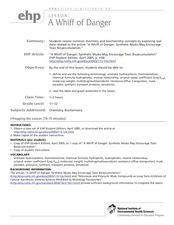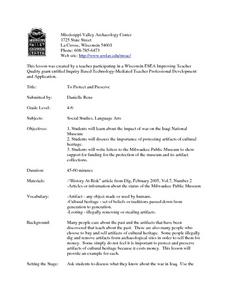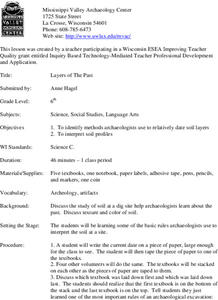Curated OER
Creating an Enzyme-Substrate Model
Students explore the reaction rates of an enzyme-mediated reaction through experimentation. In small groups, they use everyday objects to demonstrate the effects of environmental variables on enzyme function.
Students graph and...
Curated OER
Can You Find a Solution?
Learners explore the topic of public conservation. In this Florida panthers lesson, students read a scenario about the endangered panther and collaborate to plan a way to protect the panther population. Learners also participate in a...
Curated OER
Enzyme Activity: An Inquiry Based Approach
Students explore biochemical reactions mediated by enzymes in an inquiry approach. They are given two questions about the types of living materials that contain the enzymes that break down hydrogen peroxide, and under what conditions the...
Curated OER
An Enzyme- Substrate Model
Young scholars explore reaction rates of an enzyme-mediated reaction. They examine the effects of environmental variables on enzyme function. Students collect, graph, and analyze data relating to the reaction.
Curated OER
Estuary Issues
Fifth graders read a description of an estuary and search for problems that occur there. In this estuary lesson, 5th graders mediate controversial issues for the best solutions.
Gobal Oneness Project
Building a Community of Trust
Barrio de Paz is the story of Nelsa Libertad Curbelo, a nun, who works with the gang youth of Guayaquil, Ecuador. The 17-minute documentary focuses on her explanations for the rise of gangs and for how gang culture reflects societal values.
Serendip
Homeostasis, Negative Feedback, and Positive Feedback
So many bodily activities depend on homeostasis! Give learners a solid background to understand the basic process of the human body. Scholars first examine negative feedback loops contributing to body temperature regulation and then a...
Curated OER
Down in the Dumps
After an introduction to municipal sludge, middle school ecologists consider the pros and cons of dumping in the Hudson River Canyon. The class is split into two groups: one to debate in favor or dumping and one to debate against the...
Curated OER
A Whiff of Danger
Public health trainees read and write a summary of the article, "A Whiff of Danger". The article is not available through the link, but can be found on the National Center for Biotechnology Information website. After summarizing,...
Curated OER
Drugs Change the Way Neurons Communicate
Students examine that certain drugs interfere selectively with neurotransmission, and realize that the effect of a drug is dependent upon dosage and route of administration.
Curated OER
Contextual Clues
Students observe and interpret images of artifacts in different contexts in order to recognize importance of leaving artifacts in original context to correctly understand their meaning, and observe what is surrounding object to interpret...
Curated OER
To Protect and Preserve
Students discuss the impact of war on the Iraqi National Museum and the importance of protecting artifacts of cultural heritage. They write letters to the Milwaukee Public Museum to show support for funding for the protection of the...
Curated OER
How Old Is Mike?
Students examine the absolute dating of fossils, they use a list of names and ages to determine the difference between relative age and absolute age. They explore the relative age and absolute age of people and of fossils.
Curated OER
Archaeological Inquiry
Young scholars describe what they see as they observe an "artifact". They draw conclusions based on the information gathered to identify what the artifact might be used for and determine how old it might be.
Curated OER
Pieces of the Past
Students study the importance of preserving the archaeological record. They write a paragraph describing an object and why it is important to them. They cut their paper into a puzzle and compare their own to the student they trade with.
Curated OER
Filling in the Picture
Students study archaeological sites. They discover some of the problems inherent in choosing sites and what parts are chosen for excavation. They evaluate and explain their choices for study and articulate the process of archaeological...
Curated OER
Getting our Paws into the Cause
Twelfth graders examine local, state, and/or national animal welfare organization. In this Social Studies instructional activity, 12th graders research their identified organization. Students develop a planned intervention strategy to...
Curated OER
Activities of the Immune System (Activity 1)
High schoolers cut an apple in half and cover half with plastic wrap. They place drops of liquid on each half and discover how our skin protects us. They answer discussion questions to end the lesson.
Curated OER
Protective Services/ "Dump Busters"
Learners tell,write and show the importance of following correct procedures to promote safety of self, others, property, and shared resources. They
determine a crime suspect through systematic inquiry and objective information gathering.
Curated OER
A "Real" Picuture of a Scientist
Middle schoolers share their own stereotypes when they talk about scientists. In groups, they draw a picture of a scientist where they are working and the tools they most commonly used. Using the internet, they discover how archeolgists...
Curated OER
Layers of The Past
Sixth graders identify methods archaeologists use to date soil layers. They interpret soil profiles and discuss the examination of soil at a dig site. They discuss texture and color of soil.
Curated OER
Archaeology is ...
Students demonstrate the importance of context for learning about ancient people. They assess the importance of preservation of cultural resources. They exchange papers with a student in class. The students with the paper are responsible...
Curated OER
Science in the Past
Students research the science of ancient Native American people. They compare native science to the present time. They create a project that they can present to their classmates. The project could be a report, poster, Power Point...
Curated OER
Cultural Murals
Seventh graders research the cultural time period of early Wisconsin people. They create a mural depicting the diet, shelter, activities, climate, clothing, tools, and other materials used.
Other popular searches
- Peer Mediation
- Peer Mediation Scenarios
- Mediation Scenarios
- Teaching Peer Mediation
- Peer Mediation Activities
- Conflict Mediation
- Mediation Skills
- Peer Mediation Role Plays
- Mediation Process
- Peer Counseling: Mediation
- Mediation and Arbitration
- Mediation Lesson Plans

























